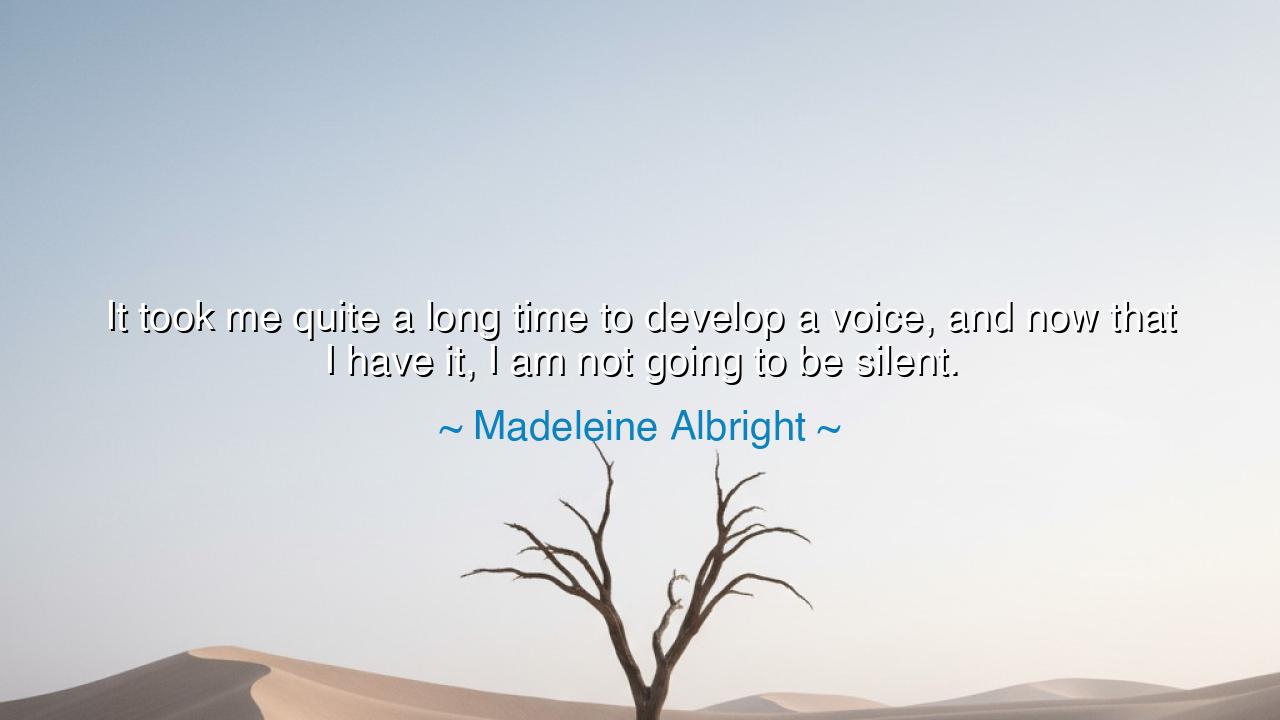
It took me quite a long time to develop a voice, and now that I
It took me quite a long time to develop a voice, and now that I have it, I am not going to be silent.






The words of Madeleine Albright, “It took me quite a long time to develop a voice, and now that I have it, I am not going to be silent,” rise with the power of triumph earned through struggle. They are not the words of one who was handed authority, but of one who fought to claim it, step by step, in a world that did not readily grant women a place at the table of power. This quote is both confession and declaration: confession of the long journey it takes to find confidence, strength, and clarity in a hostile world, and declaration that once found, such a voice must never again be silenced.
The origin of these words rests in Albright’s own remarkable life. Born in Czechoslovakia, fleeing tyranny as a child, she grew into one of the most influential diplomats of her age, becoming the first female Secretary of State of the United States. Hers was a path marked not only by politics, but by the slow building of courage. In her early career, she often sat at tables where women’s voices were overlooked or dismissed. Yet through persistence, study, and strength, she shaped her voice into one that could not only be heard, but could command nations. Her words remind us that the development of a voice is not instantaneous—it is forged in fire, trial, and endurance.
The ancients knew this same truth. Consider the story of Demosthenes, the great orator of Athens, who as a child had a weak voice and a stammer. He trained with pebbles in his mouth, reciting speeches over the roar of the sea, until his words carried power across assemblies. Like Albright, he struggled long to develop his voice, but once attained, it became a weapon against tyranny. Both stories show us that the voice is not merely sound—it is the embodiment of conviction, the channel of inner strength.
History offers other luminous parallels. Sojourner Truth, born into slavery, could not read or write, but she found a voice that thundered with justice. In her famous speech, “Ain’t I a Woman?” she shattered the silence that had been imposed upon women of her race and her time. She, too, had to endure much before her voice could be heard, but once found, she refused to let it fall silent again. Albright’s words belong to this lineage of voices that began in struggle and rose to speak for justice, equality, and truth.
The meaning of Albright’s declaration is profound: that the voice is not merely a tool of speech, but a symbol of identity and freedom. To find one’s voice is to find one’s power—the ability to stand before the world and proclaim truth without fear. Silence may be imposed by oppression, by doubt, or by convention, but once the voice is discovered, it becomes sacred. To silence it again would be to betray not only oneself, but the generations yet to come who need its strength.
The lesson we must take is this: fight to find your voice, and once you find it, never surrender it. Do not imagine that your silence keeps peace; often it only strengthens oppression. Speak, even if your words tremble, for the act of speaking will strengthen you. Albright reminds us that the journey may be long, but the destination is worth everything: a voice that can alter the course of lives, of nations, of history.
Practical action lies within our reach. Begin to train your voice by speaking truth in small matters—defending a friend, standing against injustice in your daily life, refusing to let lies go unchallenged. Seek knowledge, sharpen your convictions, and let your words be guided by both courage and wisdom. Do not fear the time it takes, for every struggle strengthens the voice that is being forged within you. And when you have found it, guard it fiercely, and use it not only for yourself, but for others who are still struggling to be heard.
Thus, in the voice of the ancients, we proclaim: Blessed are those who labor long to find their voice, for their words shall echo like thunder. Blessed are those who refuse silence, for they will be remembered as defenders of truth. And let us remember always the wisdom of Madeleine Albright: that once the voice is claimed, it must never again be silenced—for it is the very breath of freedom.






AAdministratorAdministrator
Welcome, honored guests. Please leave a comment, we will respond soon